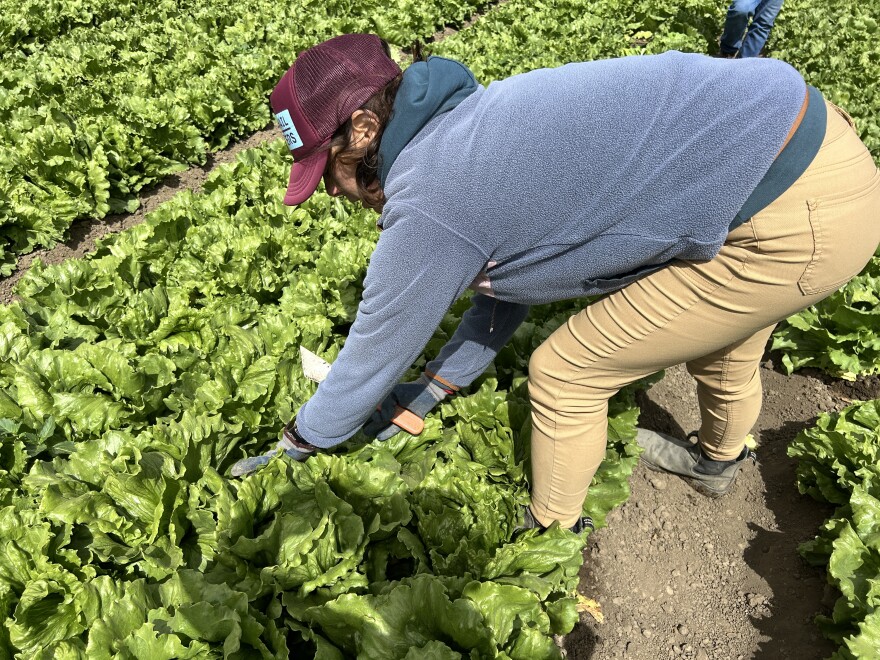Celsa Ortega walks up and down the rows of her 4.25-acre farm in Aromas on a cloudy morning in early June. She’s been farming for five years, but has only had her own plot for about a year.
She’s currently growing lettuce and three different varieties of onion.
“My biggest dream in agriculture is to understand the earth,” Ortega said, in Spanish.
A federally funded grant project aimed to foster that. Researchers at Cal State Monterey Bay got $5 million from the U.S. Department of Agriculture’s Partnerships for Climate-Smart Commodities (PCSC) program last year to test the effectiveness of three climate-smart practices on farmland in the Salinas Valley: adding compost, planting cover crops, and reducing the amount of applied nitrogen fertilizer.
The term “climate-smart” refers to strategies farmers use to reduce greenhouse gas emissions from crop production and to make their operations more resilient to climate change.
Stefanie Kortman and Arlene Haffa, the CSUMB researchers, have been gathering data on these practices at a small test site in Soledad. On a windy morning in May, they were wrapping up a lettuce harvest.
“We have achieved about a year and a half of data collection on this on-farm trial,” Kortman said.

The grant was initially supposed to fund five years of research. But in April, Kortman and Haffa got a letter from the USDA stating their grant was getting cancelled—and not just theirs. The whole nationwide program was getting axed.
“It’s extremely disappointing because it’s so abrupt,” said Renata Brillinger, the executive director of the California Climate and Agriculture Network, “and some of the projects were just now getting started.”
But weeks after Kortman and Haffa received the grant termination letter, the USDA announced it was changing course yet again.
Instead of a full-blown termination, the PCSC program is getting revamped under a new name—Advancing Markets for Producers.
Current grant recipients might be able to keep their funding as long as they comply with the new requirements. That’s what Kortman and Haffa intend to do. But Kortman said it’s unclear what exactly the USDA is looking for, so she’s not holding her breath.
“We don’t know what happens, and we don’t know when,” she said.
As part of the PCSC program, researchers forged community partnerships. Kortman and Haffa have been working with the Monterey County Resource Conservation District (RCD), which funnels some of the grant money to local farmers like Ortega.
“The way that we've been using this funding is to incentivize farmers to use compost, to cover crop, and to essentially work with us to develop plans for managing nutrients on their farms,” said Aysha Peterson, an agroecologist with the RCD.
Peterson and their team are now turning to state funding opportunities to continue payments to farmers.

Ortega is among the small-scale farmers in the Salinas Valley who have each received $10,000 to pay for compost and cover cropping.
“Yes, we work very closely with the RCD,” Ortega said, “it’s a very fundamental resource for us.” She said a cover crop she planted last winter helped nourish the soil for the spring.
Ortega has also been taking advantage of the available funding for compost, which would otherwise come with a big price tag.
“You have to do it,” she said. “Even if you don’t have the money, if you’re in the agriculture business, you have to do it. It’s a practice that the earth demands and begs for, and you have to give it.”
For Ortega, it all comes back to understanding the land and giving it what it needs to thrive. She said she sees herself one day buying a house on 20 acres and having a farm there.
But with recent cuts to USDA programs that support small farms like hers, that dream is drifting farther out of reach.
Cal State Monterey Bay holds the broadcast license for KAZU.




